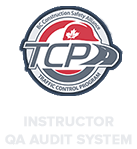
All BC Construction Safety Alliance (BCCSA) qualified Traffic Control Program Instructors (TCPI) will participate in instructor quality assurance activities to identify areas for improvement in their delivery of the BCCSA’s TCP course. Quality assurance is a key part of the Instructor Terms of Participation documented within item 21 of the License to Teach Agreement:
The BCCSA conducts a variety of quality assurance activities to confirm compliance with the Instructor Terms of Participation. This document outlines the protocol for quality assurance on instructional delivery of BCCSA’s Traffic Control Person course (2 -day) and Requalification Traffic Control Person course. The objectives are to:
The responsibilities of each party involved, BCCSA’s Quality Assurance Representative and the qualified TCP Instructor, are outlined below in Part A. Following this section is the evaluation instrument and corrective action plan process, outlined in Part B.
The role of the BCCSA Quality Assurance Representative is to evaluate the Instructor’s delivery of the BCCSA’s TCP courses against the established standard. The evaluation will serve to identify Instructor strengths and areas for improvements. The evaluation will also document any non-compliance issues that will be addressed through Instructor performance management processes.
In conducting instructor audits the BCCSA Quality Assurance Representative is responsible or the following:
Critical Action Issues can fall under categories A or B explained below:
In the case of any Critical Action Issue, the Quality Assurance Representative will recommend actions to address the issue. If it becomes apparent that the students will complete the course with inadequate training resulting in a significant personal or public safety risk, the Quality Assurance Representative holds the authority to assume the role of course Instructor for the remainder of the course at the earliest opportunity.
Such extreme interventions are only authorized in the interest of public safety where, in the reasonable opinion of the Quality Assurance Representative, a threat to public safety is imminent. Matters related to the Instructor’s knowledge, skills or abilities are to be addressed in the normal process of the audit.
In conducting in-class audits the BCCSA will evaluate Qualified TCP Instructors using the TCPI Audit Standard. The TCPI Audit Standard contains the standards required of instructors in their facilitation of the Traffic Control course as documented in the Instructor Guide and Terms of Participation. (Note, an electronic copy is located within the Instructor Gateway.)
Instructors are encouraged to familiarize themselves with the TCPI Audit Standard as it details the course facilitation requirements and instructional skills expectations.
To successfully pass an Instructor must:
If an Instructor scores less than 50% in any Element or obtains less than 80% as the overall score they will obtain a failed result. Audit failures result in application of the Performance Management policy documented in the TCP Program Instructor Terms of Participation. The policy outlines that if an Instructors obtains a failed result, the BCCSA will review the situation and can proceed with any of the following or combination thereof:
The Corrective Action Plan (CAP) describes the steps to address deficiencies identified in the audit report. While it is the responsibility of the Qualified TCP Instructor to create the CAP the BCCSA Quality Assurance Representative can provide ideas on appropriate recommendations for corrective actions at the time the audit findings are presented to the Instructor.
The Corrective Action Plan will:
Documented corrective action plans demonstrate a level of due diligence only when the corrective actions have been effectively implemented. BCCSA will keep copies of quality assurance reports and Corrective Action Plans in each Instructor file.
It is the responsibility of the Instructor to follow-through with the Corrective Action Plan. BCCSA will conduct quality assurance activities to evaluate the Instructor’s progress and completion of CAP items.
(Electronic copy is located within the Instructor Gateway)